Stohl: English A21
1.c4 e5 2.Nc3
Bb4
|
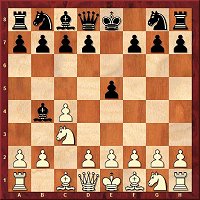
|
|
These
moves are played in the Rossolimo Sicilian, and the move order
is perhaps also possible in the English and with a tempo less.
The greatest difference consists of the extra possibility
of 3.Nd5, because there is not a black knight on f6. That is
also the main variation. |
Schipkov: English A31
1.c4 c5 2.Nf3
Nf6 3.d4 cxd4 4.Nxd4 e5 5.Nb5 d5 6.cxd5
Bc5 7.N5c3 0-0 8.e3
|
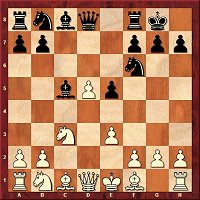
|
|
Actually
the position is more often reached via 1.d4 Nf6 2.c4 c5 3.Nf3
cxd4 4.Nxd4 and is of some significance for those who play the
Benoni or the Volga Gambit. It fits in well to
their repertoire – Black obtains good play in return for the
pawn he has sacrificed. |
Breutigam: Trompowsky Attack A45
1.d4
Nf6 2.Bg5 e6 3.Nd2
|
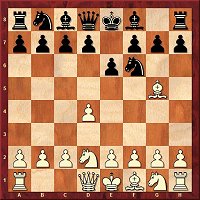
|
|
The
white knight move is designed to avoid the great quantity of
theory after 3.e4. In addition, Martin Breutigam would like to
avoid the Torre Attack and where possible does without an
early Nf3. The author refers several times to model games
played by Nikita Vitiugov. |
Krasenkow: Dutch/Semi-Slav A84
1.d4 d5 2.c4 e6 3.Nf3 (3.Nc3) 3...c6 4.e3 f5
|
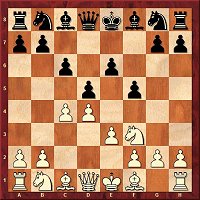
|
|
The
setup may be classified under the heading Dutch, but it is
usually reached via the Semi-Slav and is also recommended in it
by Michal Krasenkow. What is very important in it is that
White has by playing e3 made more difficult the development of
his Bc1. |
Kritz: Sicilian Defence B50
1.e4 c5 2.Nf3 d6 3.Bc4
Nf6 4.Qe2
|
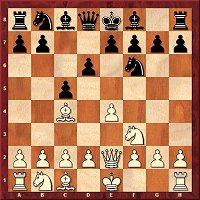
|
|
The bishop move to c4 looks really harmless, but White’s
idea is to play c3 and then d4 and set up a full centre. Black
will have to play very accurately in order to equalise.
|
Langrock: French Defence C01
1.e4 e6 2.d4 d5 3.Nc3
Bb4 4.exd5
|
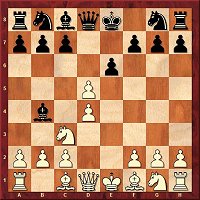
|
|
In
the third part of his series Hannes Langrock examines a few
side-lines. In addition to the dubious 4...exd5 5.Bd3 c5?! There
are also the solid 5...c6 and the attempt to break the
symmetry immediately by 4...Qxd5. |
Schandorff C84: Ruy Lopez
1.e4 e5 2.Nf3
Nc6 3.Bb5 a6 4.Ba4
Nf6 5.0-0
Be7 6.d3 b5 7.Bb3 d6 8.a4 b4
|
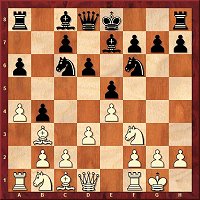
|
|
Unlike
in the case of the Anti-Marshall Variations on move 8 (6.Re1 b5
7.Bb3 0-0 and then 8.a4 or 8.h3) with 6.d3 White has saved
on the move Re1. Schandorff hopes in his article to present a
clear repertoire for the player with Black.
|
Marin D16: Slav Defence
1.d4 d5 2.c4 c6 3.Nf3
Nf6 4.Nc3 dxc4 5.a4
Bg4 6.Ne5
Bh5 7.g3
|
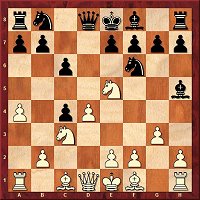
|
|
The
move 5...Bg4 has lost an enormous amount of its popularity, but
are there also objective reasons for that? In his first
contribution, which contains 7.g3, Mihail Marin cannot to his
own astonishment find any such reasons. Black can be happy with
the positions he obtains. |
Rotstein: Catalan E04
1.d4 d5 2.c4 e6 3.Nf3
Nf6 4.g3 dxc4 5.Bg2
Bb4+ 6.Bd2 c5
|
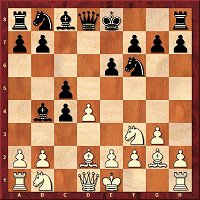
|
|
With the setup which is being presented against the
Catalan, Black is trying to seize the initiative immediately.
Although players with White have been looking for a few years
for a variation capable of giving them an advantage, according
to Arkadij Rotstein they have so far been unsuccessful.
|
Kuzmin: King's Indian E61
1.d4
Nf6 2.c4 g6 3.Nc3
Bg7 4.Bg5
|
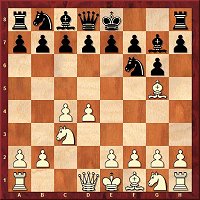
|
|
In
the 2nd part of his investigations into the setup with an early
4.Bg5 our author Alexey Kuzmin turns to those lines in which
Black first of all does without ...d6. There are some subtleties
to take into account here. For example, White’s
reaction will be different according to whether ...h6 has been
played or not. |
Postny: King's Indian E94
1.d4
Nf6 2.c4 g6 3.Nc3
Bg7 4.e4 d6 5.Nf3 0-0 6.Be2 e5 7.0-0 exd4 8.Nxd4
Re8 9.f3 c6 10.Kh1
Nh5
|
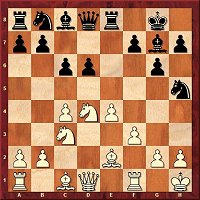
|
|
In
the variation with an early ...exd4 nowadays 10...Nh5 appears
to be somewhat more popular than the more frequently played
10...Nbd7. Evgeny Postny, however, sees a slight advantage
for White, and in any case 11.g4 Nf6 result in really
double-edged positions. |